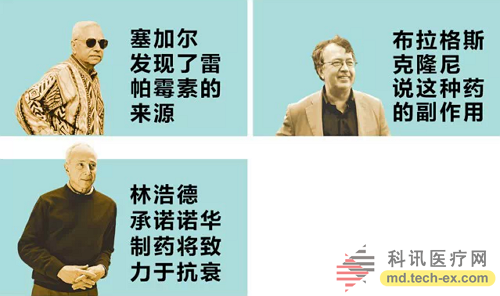Release date: 2015-03-27

In the early 1980s, one afternoon, Suren Sehgal brought back a strange parcel from the unit and stuffed it into the freezer at home. The package, which is squeezed in the middle of a pile of ice cream, is covered with a thick plastic film with capital letters indicating "can't eat!". Inside are a few small glass bottles filled with white paste - a few decades later, one of the most promising anti-aging drugs was born, based on the rare bacteria contained in the bottle. In 1972, when Segal worked at a pharmaceutical factory in Ayerst Laboratories in Montreal, he first extracted the bacteria from soil samples and has been working on it since then.
These soil samples were collected by a medical expedition in Canada beneath many mysterious heads on Easter Island in the middle of the Pacific Ocean. From this soil, Segal found Streptomyces hygroscopicus, a bacterium that secretes potent antifungal compounds. This made him curious; he thought he might be able to use it to make an ointment for the treatment of athlete's foot or other fungal infections. He purified the substance and named it rapamycin in the indigenous language of Easter Island, "Rapa Nui."
This potential of this substance is quickly proven. Once, I heard that the neighbor's wife's skin fungal infection has been cured for a long time, and Segal adjusted her rapamycin ointment. “It’s illegal to do this,†said his son Ajai Sehgal—but the ointment works, and the infection quickly heals. Su Lun was born in a small village now belonging to Pakistan. When he immigrated to Canada and worked in biochemistry, he suddenly realized that he must have found something special inadvertently. However, before he further research, Elster closed the laboratory in Montreal, and the boss ordered the destruction of all "unformed" compounds, including rapamycin. Segal couldn't get his hands. On the contrary, he secretly put a few tubes of Streptomyces hygroscopicus into the freezer in the house. The vast majority of employees were fired, but Segal was transferred to the company's lab in Princeton, New Jersey. He wrapped the plastic film with dry ice and brought them to the United States.
In 1987, Wyeth, a multinational health care company based in Pennsylvania, acquired Elster, who persuaded his new boss to allow him to continue research on this rare bacterium. He found that in addition to antifungal properties, rapamycin inhibits the immune system. When a new kidney or other organ is transplanted, it naturally causes rejection, and it can suppress this reaction. Finally, in 1999, the US Food and Drug Administration (FDA) approved rapamycin as a drug for organ transplant patients. A few years after receiving FDA approval, Seghar died of illness. He walked too early. He had not had time to see his research save the lives of tens of thousands of transplant patients and earned hundreds of millions of dollars in income for Wyeth. .

Since then, rapamycin has been used in a variety of applications. Like penicillin, it is a biological preparation and therefore cannot be patented, but its derivatives can. Rapamycin is usually used by pharmaceutical companies on the layer material of the heart stent to prevent scar tissue and restenosis. Derivatives of rapamycin have been approved for the treatment of certain types of kidney, lung and breast cancer. This may just be the beginning. Over the past decade, research has shown that it is not only expected to prolong life by delaying the progression of aging-related diseases such as cancer, heart disease and Alzheimer's disease, but may also delay the effects of normal aging. Focusing on the way it will likely change the aging of millions of people, Novartis, the Swiss pharmaceutical giant with a market value of $260 billion, has embarked on the development of rapamycin as the first true anti-aging drug in humans.
The history of the drug is full of all kinds of drugs that can be prolonged, from resveratrol in the early 21st century ("red wine pills") to testicular implants in the 1920s, and then to the alchemy of the Middle Ages. Anti-aging function). But no one can withstand rigorous clinical trials until rapamycin appears, and this situation is expected to break through.
"Research has repeatedly shown that rapamycin can prolong life," said Matt Kaeberlein, a leading scientist in aging biology at Washington University. He added that the current study is limited to experimental mice and has not yet entered human clinical testing, but its impact on longevity is particularly exciting. The drug appears to delay the "age-related decline in many different organs, and achieving this goal will hopefully slow down the aging process."
Kebellein and other researchers believe that the prospect of rapamycin is to treat aging - some chronic diseases are caused by aging and eventually die, which is why we take medicine to lower cholesterol to prevent heart disease. One truth. “I see it as the ultimate preventive drug,†Kebellein said. He is currently leading a rapamycin study with dogs as subjects.
Not everyone thinks so. “So far, no intervention has proven to delay, stop or reverse the aging process in humans,†said S. Jay Olshansky, professor of public health at the University of Illinois at Chicago. For years, he has been publicly criticizing various legends for life-sustaining nutrients and therapies. He stressed that "anti-aging drugs currently score zero."
Olishanski said that he welcomes the emergence of such treatments as rapamycin, but believes that it is not enough to understand it: "I always warn you not to be anxious, let science explain everything, first of all, carefully evaluate these interventions. The safety and effectiveness of the means." This kind of advice is completely reasonable, but the enthusiasm of scientists like Kebelin is hard to resist. "We can delay the onset of all these diseases by understanding and interfering with the molecular processes that drive the aging of the human body," he said. "Now we know that this is not impossible."
Rapamycin plays a fundamental role in cell biology. In the early 1990s, scientists at Sandoz, the predecessor of Novartis Pharmaceuticals, discovered that rapamycin molecules block a key cellular signaling pathway that regulates growth and metabolism. This pathway was finally named "targeted rapamycin" (TOR for short), which is present in all living organisms from yeast to humans (this pathway in mammals called mTOR).
MTOR is like a circuit breaker in a factory: when activated, cells can grow and divide, consuming nutrients and producing proteins. And when it shuts down, the "factory" turns into a protective mode, through a method called autophagy, which cleans the house and recovers proteins. Researchers believe that limiting calorie intake can extend animal life, one of the reasons is that it can slow down this mTOR pathway and initiate autophagy. Rapamycin produces the same effect without being hungry because of restrictions on diet.

“What rapamycin does is actually access to the body responsible for dealing with nutrient deficiencies,†said Brian Kennedy, CEO of the Novatobak Institute on Aging in California. It has evolved for hundreds of millions of years, and it’s time to come. When we meet a good year, we grow and have children. When the situation is not good, we enter a high-pressure mode so that we can survive. Come down and wait for the next hunt. So, the ability to withstand stress is good for delaying aging."
Among all the scholars who advocate rapamycin for anti-aging drugs, the enthusiasm of Russian scientist Mikhail Blagosklonny is the highest. He was born in St. Petersburg and currently works at the Roswell Park Cancer Institute in Buffalo. At the beginning of the 21st century, Skrone of Prague realized that the characteristics of rapamycin in slowing tumor growth may also be used to delay the aging process. Because he is convinced of the potential and safety of rapamycin, he even put this medicine on himself. “Some people ask me about the dangers of taking rapamycin,†says Prague Sclini. “The risk of not taking rapamycin is greater than the risk of overeating, smoking, and not wearing a seat belt when driving. â€
Many colleagues feel that his enthusiasm has passed. When Prague's Sclini submitted papers discussing relevant opinions to major journals, it was all rejected. “Sometimes the reviewer even bluntly calls my name,†he said. But by 2009, things began to change, when a large-scale study funded by the National Institutes of Health (NIH) found that rapamycin and its derivatives prolonged the lifespan of mice. NIH scientists begin dosing in mice for 20 months, which is equivalent to the middle-aged mouse (the mice usually live two to three years). The maximum lifespan of male rats taking rapamycin was extended by 9%, while that of females was extended by 14%. This is equivalent to letting a 60-year-old woman take a drug, so they can live to celebrate their 95-year-old life.
There is a problem here: rapamycin suppresses the immune system (this is why it is effective against transplant rejection). Many scientists and doctors believe that this will be the Achilles heel used to treat the body's aging. Allowing some elderly patients with weakened immunity to take such drugs will make them vulnerable to the impact of a potentially life-threatening infection, which is contrary to the intention of taking the drug.
Faithful believers like Prague's Sclini ushered in a breakthrough on Christmas Eve 2014. On this day, a journal published in the journal Science Translational Medicine published a paper in which a study of Australian and New Zealand volunteers found that small doses of rapamycin were taken under strict guidance. In elderly patients with the hormone derivative everolimus, their immune response has increased. Although such a discovery is unlikely to be reported by CNN TV, it is of great significance to scientists who study human aging worldwide. “This is a watershed,†says Nir Barzilai, director of ageing research at the Albert Einstein College of Medicine in New York.
This study shows for the first time that rapamycin appears to enhance immune response, and it increases the efficacy of influenza vaccine in subjects aged 65 or older. "It seems to regulate the immune response, not to suppress it," Barzile said. "This is exciting." Another reason that the study is compelling is that Novartis has funded the project. In most cases, large pharmaceutical companies have been evading the issue of aging, because people generally think that this is a bottomless pit. In 2008, GlaxoSmithKline spent $720 million to acquire Sirtris Pharmaceuticals, a biotech startup founded by Harvard professor David Sinclair. To develop drugs based on resveratrol. As an antifungal compound found in grapes that make red wine, resveratrol has received numerous media reports including "60 Minutes", The New York Times and Barbara Walters. It is said to be the behind-the-scenes hero of the "French Paradox". The paradox is that although the French love to eat greasy food, they are still quite healthy. A widely disseminated journal of Nature
The paper said that resveratrol can prolong the life of mice eating high-fat foods. After the study was published, sales of resveratrol health supplements soared from almost zero to about $100 million a year. However, these drugs were declared ineffective in human experiments. In 2013, GlaxoSmithKline closed Certris and fired most of them.
"The difference between rapamycin and resveratrol is that the former does achieve the effect of propaganda, and the latter does not work," Kebellein of the University of Washington said: "If you look closely at the data, you will agree Keberlein studied under Sinclair when he was a graduate student at the Massachusetts Institute of Technology (MIT), but earlier publicly criticized resveratrol, pointing out that it did not actually extend the lives of normal mice. The cycle does not delay its aging process - it seems to be only useful for obese mice.
It has been found that rapamycin reduces osteoporosis associated with aging in laboratory mice, reverses heart aging, and controls chronic inflammatory responses. Even studies have shown that it can reverse Alzheimer's disease in mice. The Novartis-funded study was the first to address the role of rapamycin in the age-related indicators of healthy elderly populations. Kennedy of the Buck Institute said: "This is a milestone study, which is precisely the type of research we need more."

This does not mean that everyone has to go to the doctor to ask for prescription drugs for mTOR inhibitors. Critics say that for those who are generally healthy, taking it may be a big risk. In addition to the possibility of suppressing the immune system, the side effects of rapamycin also include oral ulcers and affect wound healing. "Rapamycin is a fundamental signaling pathway, so you need to get more safety data before using it as a drug for healthy people," says University of Southern California professor Valter Longo. He has discovered the key signaling pathways associated with TOR, he said. He further pointed out that intermittent fasting can close the same signaling pathway without side effects.
Novartis researchers have tried to bypass the side effects of immunosuppression with very low-dose, defined-cycle medications. They found that even after a long period of withdrawal, its benefits continue to work. But Janko Nikolich-Zugich, director of the Department of Immunobiology at the University of Arizona and co-director of the Arizona Center for Aging, cautions that the study is far from a decisive conclusion on the issue.
This study measures the response to vaccines, not to pathogens. Nikolić-Zujic is therefore worried that rapamycin may prevent immune cells from replicating too quickly, so that it is too late to resist large-scale invasion of pathogens. “I feel that this is not a definitive study in any way, form or perspective. It does not address the question of how mTO inhibitors will react in the face of infection.â€
A revolutionary clinical trial that will begin in March may untie some questions. Kebellein and his colleague at the University of Washington, Daniel Promislow, plan to conduct a small dose test of rapamycin in middle-aged pet dogs. Their focus will not be on life, because it takes years to study, but to look for signs of the drug's impact on key age-related indicators, such as arteriosclerosis and heart function. If successful, rapamycin and its derivatives will eventually become the first anti-aging drug to be used on dogs. Kebellein didn't mind this, he said: "I love my dogs. If we can do something to make them live longer and healthier, we should do it. Personally speaking I have to do this."
In September last year, Novartis Chairman Joerg Reinhardt announced that the company will be working on aging research. In a drug research conference in Basel, Switzerland, he said in his keynote speech: "In the long run, people may think of drugs. The productivity of R&D has fallen sharply.†While aging represents a fertile ground to be explored, screening for aging-related signaling pathways and proteins is expected to uncover promising drug targets. By adjusting the appropriate pathways, researchers will be able to theoretically prevent a range of age-related diseases. In this research direction, Novartis is not alone: ​​last fall, AbbVie, based in Chicago, announced a joint venture with Calico, the aging research company founded by Google, with a $500 million investment.
Rapamycin is not the only drug that has been widely used and has been found to have anti-aging efficacy potential. Millions of people with diabetes use a drug called metformin that has been around for decades. Like rapamycin, metformin extends the lifespan of mice in a clinical trial funded by the US government. There is evidence that it has the same effect on humans. Diabetes usually reduces people's life expectancy for five years. However, a large retrospective analysis found that patients taking metformin had a 15% lower mortality rate compared with patients who had the same condition but did not take metformin. "In my opinion, this means that it is actually going to delay aging as a therapeutic goal," Kennedy said.
However, they will face the same problems as GlaxoSmithKline: the FDA cannot approve any drugs designed to "treat" aging, because aging is not a disease. Another obstacle is that any drug that is actually used to treat healthy people needs to meet extremely high safety standards. "These drugs have fewer side effects than aspirin," said Randy Strong, a pharmacist at the St. Anthony Health Science Center at the University of Texas. Strong participated in the 2009 NIH rapamycin study.
Mark Fishman, head of the Novartis Institute for Biomedical Research in Cambridge, Mass., said that this may explain why Novartis adopted a gradual approach to development that puts the goal In the treatment of certain diseases. “We are not looking for a magical pill that will make everyone live to 120, but a treatment-oriented,†he said.
The company's aging-related R&D product line also includes a new drug for heart failure, which the EU has recently incorporated into the rapid approval channel. Another drug called bimagrumab is used to reverse muscle loss. The drug, described by the FDA as "breakthrough", will soon enter clinical phase III studies, which target a rare disease called "sporadic inclusion body myositis," but it is possible to expand the range of indications. Used for muscle atrophy and muscle weakness in elderly patients. "The whole problem of debilitation, coupled with Alzheimer's disease, is the main cause of the elderly's loss of mobility and the painful struggle," Fishman said.
There is also a drug under development that is expected to rebuild cartilage tissue in aging joints, and the most interesting is a gene therapy that reverses the loss of hair cells in the ear canal. This cell is essential for good hearing. But it will be destroyed by antibiotics, chemotherapy and "too much Lady Gaga", Fishman said.
Dr. Fishman is particularly cautious about the anti-aging potential of rapamycin, which sells rapamycin-derived anti-tumor drugs called Afinitor and is known as Zortress. The transplants were resistant to xenobiotics and sales in 2012 exceeded $1 billion. (Pfizer, which acquired Wyeth in 2009, also sells rapamycin-derived drugs under the trade name Rapamune.) "I still doubt whether there will be a panacea in the world," Fishman said. "But [ The 2014 study] provides good evidence, and it is of great interest. Now we should at least consider whether and how to carry out the next step of research and development."

Prague's Sclown is not so careful and not so patient. In his view, rapamycin has been approved for more than 15 years, and no serious problems have occurred so far. “I read all the research literature on its side effects,†he said. “And its side effects are even milder than aspirin.†He said he felt good about taking the drug himself, “the same feeling after exercise.â€
Novartis strongly opposes the use of rapamycin outside its approved use. Company spokesperson Mariellen Gallagher wrote in an e-mail: "It is too early to say whether low-dose rapamycin can prolong human life. Only clinical tests have proven it can Providing a good risk/benefit ratio ensures that mTOR inhibitors like rapamycin provide safe and effective treatments for human aging-related symptoms."
In any case, if Segal is still alive, he will be very proud. His son Ajay said that after being diagnosed with cancer in 1998, his father started taking rapamycin - although the drug was not approved for any condition at the time. He just presupposed that the drug might delay the spread of cancer, even though the cancer had been transferred to his liver and other organs. The doctor predicted that he could live for two years, but he had lived successfully for several years, and the tumor seemed to be dormant. The only side effect is oral ulcers, but this is naturally a small price compared to tumors.
But in 2003, five years later, at the age of 70, Segal decided to stop taking the drug. He told his wife that if it weren't, he would never know if it was the medicine that delayed his condition. Ajay said that the tumor quickly came back and he died a few months later. "He said to me before his death, 'The most stupid thing I have done in my life is to stop taking medicine."
Source: Bio-Exploration
Heated Tobacco Products,Heated Tobacco Vs Vaping,Heated Tobacco Device,Heated Tobacco Vs Cigarettes
KOKEN Co., Ltd , https://www.hnb-maker.com